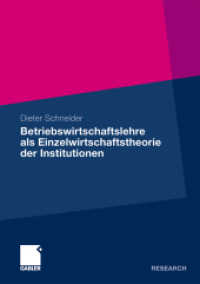- ホーム
- > 洋書
- > 英文書
- > History / World
基本説明
New in paperback. Hardcover was published in 1998.
Full Description
This groundbreaking book blends international relations and gender history to provide a new understanding of the Spanish-American and Philippine-American wars. Kristin L. Hoganson shows how gendered ideas about citizenship and political leadership influenced jingoist political leaders` desire to wage these conflicts, and she traces how they manipulated ideas about gender to embroil the nation in war.
She argues that racial beliefs were only part of the cultural framework that undergirded U.S. martial policies at the turn of the century. Gender beliefs, also affected the rise and fall of the nation`s imperialist impulse.
Drawing on an extensive range of sources, including congressional debates, campaign speeches, political tracts, newspapers, magazines, political cartoons, and the papers of politicians, soldiers, suffragists, and other political activists, Hoganson discusses how concerns about manhood affected debates over war and empire. She demonstrates that jingoist political leaders, distressed by the passing of the Civil War generation and by women`s incursions into electoral politics, embraced war as an opportunity to promote a political vision in which soldiers were venerated as model citizens and women remained on the fringes of political life. These gender concerns not only played an important role in the Spanish-American and Philippine-American wars, they have echoes in later time periods, says the author, and recognizing their significance has powerful ramifications for the way we view international relations.Yale Historical Publications








